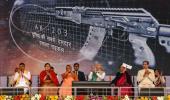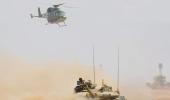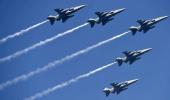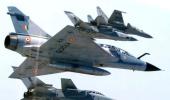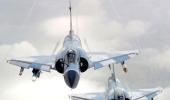Indians must remember that Pakistanis hate losing to India, at war or in cricket, says Sanjeev Nayyar.
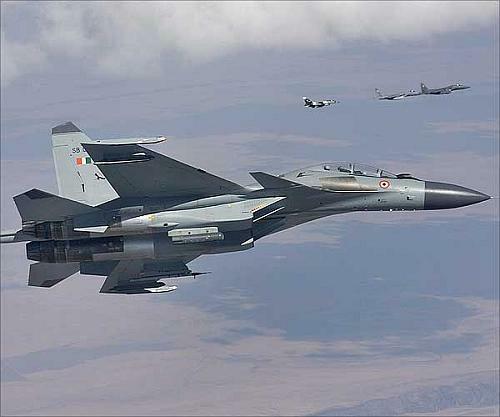
During a recent visit to New Delhi, an auto driver Jeevan asked me if Wing Commander Abhinandan laut aaya kya. Later that day, a friend's home maker wife spoke about an Indian MiG-21 shooting down a Pakistani F-16.
The auto driver seemed to have an hourly update on Abhinandan Varthaman and supported the air strikes. The homemaker, a graduate from the WhatsApp University, asked why IAF pilots flew such old aircraft.
Spurred by non-stop television coverage, India's retaliation post-Pulwama has caught the national imagination as rarely ever before. Every person has a view, whether one agrees with it or not is immaterial.
There is a silver lining to the recent events. Here are some thoughts.
One, when the average person starts talking about old fighter aircraft, it is time for the incoming government to seize the momentum and place orders for new aircraft.
The purchase could be funded by Aircraft Purchase Bonds that are subscribed to by individuals and corporates.
Two, the people of India must question the defence secretary on delays in acquisition of equipment.
Former high commissioner to Pakistan G Parthasarathy recently wrote (external link), 'This again exposed the inefficiency of our defence ministry, which has delayed a proposal for the modernisation of the fighter fleet for over two decades. Successive defence ministers must accept Constitutional responsibility for the cavalier manner in which the entire issue of modernisation has been handled.'
Three, did you know that Pakistan has a horizontal width of only 427.52 km? The Pakistanis are aware of their vulnerability, and hence seek strategic depth in Afghanistan in the event of an Indian attack or domination of air space.
The recent IAF strikes have reminded Pakistanis of their vulnerability. It is essential to give your opponents a reality check from time to time.
Four, hours have been spent discussing how many died in the IAF bombing. The question is irrelevant.
Geostrategist and author Brahma Chellaney tweeted on March 5, 'That India penetrated Pakistani air defences and bombed a far-off target with impunity sent a chilling message to Pakistan's generals about vulnerability. Extent of damage or death toll is immaterial.'
Those who want proof of air strikes or the number of deaths should petition the courts that during surgical strike 3, anchors and cameramen should, at their own risk, be permitted to report live just like was done during 26/11.
Five, there was an unheard of surge in nationalism post-Pulwama. Indians wanted to contribute to the families of the slain CRPF jawans. So strong was the desire to donate that the site BharatkeVeer was down for hours on the first Saturday post-Pulwama attacks because its servers could not handle the load.
The government must also ensure that individual donations to the Army Battle Casualties Welfare Fund receive tax breaks under section 80G of the Income-Tax Act.
The rich and poor, both feel for jawans. It is imperative for the government to create a user and tax-friendly framework.
Six, even Bollywood which, according to this Hindustan Times article (external link), projects 'Pakistanis as welcoming, courteous, open-minded and courageous', was forced to adopt a nationalist stance.
Hopefully, it is not a one-off approach, they will change portrayals and also not hire artistes from Pakistan.
Seven, I hope Uri-Nagrota-Sunjwan and Pulwama will motivate the government to complete projects that ensure India utilises its share of waters under the Indus Water Treaty. Talk less, complete work, should be the approach.
Eight, hope the media focus on Wing Commander Abhinandan stops so he can work and live normally.
Note that India has indicated not once, but twice that it has the will and capability of a nation to retaliate to an attack.
If in spite of recent events India goes ahead with the Kartarpur Corridor, it will become a nightmare for the security forces. Hope better sense prevails.
Let us now look at why most countries supported India and related issues.
The Islamic Republic of Pakistan has for decades received support from the Muslim world and the US. Prime Minister Narendra Damodardas Modi's visits to Saudi Arabia, the UAE and the US were attempts to cut off support for Pakistan.
Nine, sceptics might accuse this government of intercepting a boat carrying a runaway Dubai princess off Goa, handing her over to the United Arab Emirates authorities and violating human rights. But there is no morality in geopolitics.
Modi's repeated visits to the UAE have helped in establishing a meaningful relationship with its rulers and their appreciating India's point of view.
Ten, for decades India had a defensive approach towards Saudi Arabia -- we are dependent on crude supplies, and remittances from millions of Indians who work there.
The wise say it is all the mind.
Through a combination of using crude purchases as an instrument of foreign policy and diplomacy, India has moved from a defensive to a balanced approach with Saudia Arabia.
According to this Telegraph report (external link), 'The world's biggest democracy now imports around 800,000 barrels per day of Saudi crude, accounting for just over 10pc of its total shipments abroad. India's existing refineries are also being increasingly retuned to handle more of the heavier Saudi oil, which no longer has such a strong market in the US.'
India purchased crude from the US (external link) for the first time in 2017, and continues to buy oil from Iran even post US sanctions whilst paying in rupees (external link) and is among the largest buyers of Venezuelan crude today. These moves are not lost on the Saudis.
Note what Bharat Karnad recently wrote, 'It helps Riyadh in the Islamic world if India, with the second largest Muslim population after Indonesia, is seen on its side not only in the competition with Erdogan and Turkey for leadership, but in the more significant Sunni-Shia tussle underway with Iran for influence in, and control of, West Asia.'
Being aware of your strengths and leveraging them is as important as knowing your weaknesses.
Eleven, the US has supported India's right to retaliate.
The government has engaged the US extensively and perhaps a reined in Pakistan is in the US's best interest as it seeks to exit Afghanistan.
Twelve, a terrorist attack from Pakistani soil resulted in the death of 29 Iranian revolutionary guards days before Pulwama. If the Iranians had any doubt on dangers posed by Pakistan, this terror attack should have quelled them.
It is the right time for India and Iran to focus on building the Chabahar port, boost economic ties and strengthen counter-terrorism.
Focus on Chabahar port and continued economic assistance might also improve relations with the Taliban who seemed to indicate an appreciation of India's role.
Thirteen, nearly two decades after then prime minister Inder Kumar Gujral disbanded India's covert action capability in Pakistan, it is time for India to re-build the same.
To recall what Ambassador Parthasarathy wrote, 'Prime Minister Indira Gandhi's supervised covert actions in Bangladesh in 1971 virtually destroyed maritime communication facilities there, even before the conflict started in December 1971.'
It is one of the many tools required to keep Pakistan under pressure 24x7. The Iranians have it, the Israelis have it, why not India?
Fourteen, if recent events do not make mandarins in the ministry of external affairs realise that China's propping up of Pakistan is a ploy to contain India, nothing will.
India's refusal to be part of the Belt and Road Initiative and new found boldness have not gone down well with the Chinese.
She needs to recalibrate her China policy accepting that the Pakistan-China nexus is Sanatan -- eternal.
Lastly, for decades every prime minister made peace overtures to Pakistan, got angry after every terror attack, only to be cowed down later. Indians are tired of this approach because their leaders do not learn from history.
It should be made mandatory for all prime ministers to read Thoughts on Pakistan on assuming office. Written in 1941, Dr B R Ambedkar's understanding of the sub-continental Muslim mind is outstanding.
The jingoism, boastful threats and war-mongering towards Pakistan need to stop. Indians should be benchmarking themselves with the best in the world, not a rogue neighbour.
Nothing will consistently change India's relationship with Pakistan and China unless India has a clear-cut 'forward-looking' policy framework.
Reacting to terror attacks or Chinese moves means India is always on the back foot. Things are changing, but the pace needs to hasten.
Indians must remember that Pakistanis hate losing to India, at war or in cricket. All through the 1980s-1990s and early 2000s, India lost to Pakistan till Saurav Ganguly's boys defeated Pakistan in Pakistan in 2004. The Pakis have not recovered from that loss yet.
India's political leadership needs a Saurav Ganguly.
Sanjeev Nayyar is an independent columnist, founder www.esamskriti.com and chartered accountant. He tweets @sanjeev1927
